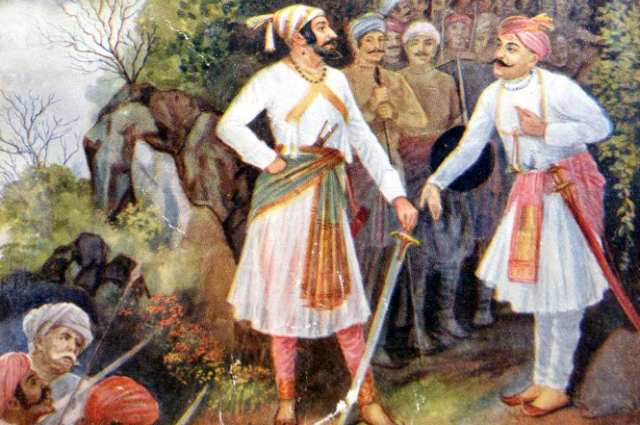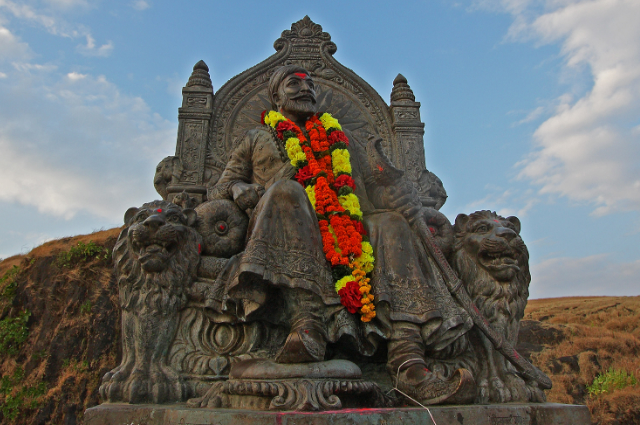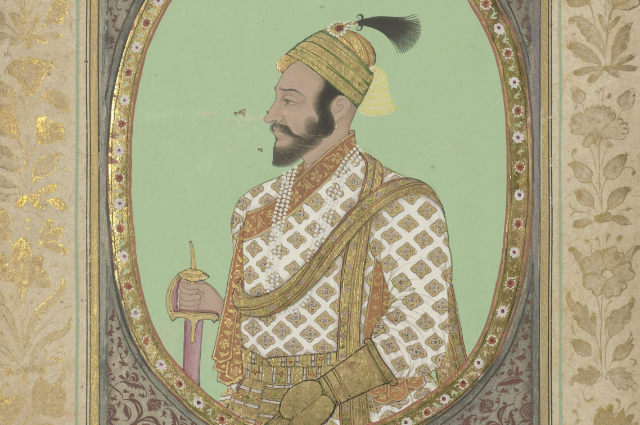Chhatrapati Shivaji Maharaj, also known as Shivaji Bhosale, was a legendary Maratha warrior king who lived from 1630 to 1680. Shivaji Maharaj’s reign marked a significant period of resistance against the oppressive Mughal Empire, which ruled over large parts of India at the time. He is considered one of the greatest rulers in Indian history and is revered as a national hero in the state of Maharashtra, India. Shivaji Maharaj, revered as a visionary leader and a symbol of valor, possessed a multifaceted personality that combined military prowess, administrative acumen, and a deep sense of justice. Shivaji Maharaj’s unique personality and remarkable leadership qualities not only transformed the political landscape of India but also left an indelible mark on the hearts and minds of millions of people.
A BRIEF HISTORY
Shivaji was born on February 19, 1630, in Shivneri Fort, near Pune in present-day Maharashtra, India. He was born into the Bhosale Maratha family, his father, Shahaji Bhosale, was a prominent military commander in the Bijapur Sultanate; his mother, Jijabai, played a crucial role in his upbringing, instilling in him a deep sense of pride and love for his land.
In 1645, at the age of 15, Shivaji led his first military campaign by capturing the Torna Fort from the Bijapur Sultanate. This marked the beginning of his ambitious plan to establish a Maratha kingdom. Over the following years, Shivaji successfully captured several forts in the Sahyadri Mountain range, including Rajgad, Kondana (Sinhagad), and Purandar. These conquests significantly expanded his territory and provided a strong base for his future endeavors.
In 1656, Shivaji seized the strategically important Raigad Fort, which he later made his capital. The coronation ceremony of the Chhatrapati (emperor) of the Maratha Empire took place at Raigad in 1674.
Recognizing the importance of naval supremacy, Shivaji built a powerful navy and successfully captured several important ports, including Janjira, Suvarnadurg, and Goa. These conquests established Maratha's control over significant coastal regions.
Shivaji implemented administrative reforms to create a well-organized and efficient state. He established a council of ministers known as the Ashta Pradhan (Eight Ministers) to assist him in governance. Other reforms included revenue administration, justice system improvements, and the promotion of local self-government.
In 1665, Shivaji signed the Treaty of Purandar with the Mughal Empire, represented by Jai Singh I. As part of the treaty, Shivaji had to give up several forts, pay a large indemnity, and agree to serve as a Mughal vassal. However, he used this period to regroup and strengthen his forces.
In 1666, Shivaji visited the Mughal court in Agra, where he was imprisoned by Aurangzeb. However, Shivaji managed a daring escape from Agra in 1666, cleverly avoiding capture by the Mughals and returning to the Deccan.
In 1659, Shivaji faced the Mughal army led by Afzal Khan at the Battle of Pratapgad. In a legendary encounter, Shivaji killed Afzal Khan in a personal combat encounter, securing a significant victory and boosting the morale of his troops.
Chhatrapati Shivaji Maharaj passed away on April 3, 1680, at the age of 50. His legacy as a courageous warrior, visionary leader, and champion of Hindu self-rule lives on, inspiring generations and shaping the course of Indian history.
These events, along with numerous others, contributed to the remarkable history of Chhatrapati Shivaji Maharaj and his enduring impact on Indian culture and history.
A DETAILED ANALYSIS OF HIS PERSONALITY

Image by M. V. Dhurandhar - Wikimedia
As the following, we will delve into the personality traits that shaped Shivaji Maharaj's character and made him an iconic figure in Indian history.
- Leadership and Vision:
Shivaji Maharaj was a born leader who possessed a clear vision for his kingdom. From a young age, he displayed exceptional leadership qualities, demonstrating his ability to rally his people and unite them under a common cause. He envisioned a sovereign Maratha kingdom, free from foreign domination, and worked relentlessly to achieve this goal. His ability to inspire loyalty and trust among his followers was instrumental in establishing an effective administration and a formidable military force.
- Courage and Resilience:
Shivaji Maharaj's unwavering courage and resilience were instrumental in his triumphs on the battlefield and in the face of numerous challenges. He fearlessly confronted adversaries and never shied away from taking risks. His audacious expeditions, such as the audacious raid on Shaista Khan's palace, demonstrated his indomitable spirit. Shivaji Maharaj's ability to bounce back from setbacks, such as the temporary loss of forts, showcased his resilience and determination to fulfill his mission.
- Military Genius:
Shivaji Maharaj was a military genius who employed innovative strategies and tactics in warfare. He recognized the importance of guerrilla warfare and utilized it effectively against the superior forces of the Mughal Empire. Shivaji Maharaj emphasized the importance of naval power, leading to the creation of a strong navy that controlled key coastal areas. His military acumen, combined with his meticulous planning and disciplined troops, allowed him to win several crucial battles and expand his kingdom.
- Administrative Skills:
In addition to his military prowess, Shivaji Maharaj was an astute administrator. He laid the foundation of a well-organized administrative system that ensured efficient governance. He established a council of ministers known as the Ashta Pradhan (Eight Ministers), each responsible for a specific department. This system promoted decentralization of power, enabling effective administration at the grassroots level. Shivaji Maharaj also implemented policies to promote agriculture, trade, and infrastructure development, which contributed to the overall prosperity of his kingdom.
- Strategic Alliances and Diplomacy:
While Shivaji Maharaj was a formidable warrior, he also recognized the importance of diplomacy and forging strategic alliances. He skillfully navigated complex political landscapes, establishing diplomatic relations with regional powers, including the Mughals, the English, and the Portuguese. Through calculated alliances, Shivaji Maharaj successfully expanded his influence and ensured the stability and security of his kingdom. His diplomatic acumen enabled him to negotiate favorable treaties and secure significant concessions for the Maratha Empire.
- Social Reforms and Welfare:
Shivaji Maharaj was not only a conqueror but also a benevolent ruler who prioritized the welfare of his subjects. He introduced several social reforms aimed at improving the lives of his people. Shivaji Maharaj abolished unfair taxes, promoted trade and commerce, and implemented policies that protected the rights of women and marginalized communities. He established a robust system of justice, ensuring equitable treatment for all, regardless of their social status.
- Devotion and Religious Tolerance:
Shivaji Maharaj was deeply religious and had a strong sense of devotion. He was an ardent follower of the Hindu deity Lord Shiva and Goddess Durga, held high respect for other religions as well. Shivaji Maharaj practiced religious tolerance and ensured that his subjects were free to follow their own faiths without discrimination. His respect for religious diversity and the protection of temples, mosques, and churches within his kingdom endeared him to people of different faiths.
- Empowerment of Women:
Shivaji Maharaj demonstrated a progressive outlook by empowering women and granting them positions of authority. He encouraged their education, training, and active participation in various spheres of governance. The appointment of a female military commander, Jijabai, and the establishment of women's military units (Durga Pathaks) were remarkable initiatives that challenged traditional gender norms and paved the way for gender equality.
- Cultural Patronage:
Shivaji Maharaj was a patron of art, culture, and literature. He encouraged the development of Marathi language and literature, promoting the use of the vernacular in administrative affairs. Shivaji Maharaj also supported artists, musicians, and scholars, recognizing their contribution to the enrichment of society. His patronage of cultural activities helped foster a sense of pride among his subjects and contributed to the preservation of Marathi heritage.
- Ethical Values and Integrity:
Integrity and ethical values were the hallmarks of Shivaji Maharaj's personality. He upheld a strict code of conduct known as "Hindavi Swarajya," emphasizing ethical governance and the welfare of his subjects. Shivaji Maharaj believed in the importance of truthfulness, honesty, and justice. He set high standards for himself and expected the same from his officials. His commitment to moral principles earned him the trust and respect of his people, who saw him as a just and righteous ruler.
CONCLUSION:
The personality of Chhatrapati Shivaji Maharaj was a harmonious blend of leadership, military genius, administrative skills, devotion, religious tolerance, social welfare, ethical values, cultural patronage, and strategic vision. His multifaceted persona, characterized by integrity, compassion, and a relentless pursuit of justice, continues to inspire generations. Shivaji Maharaj’s legacy is deeply rooted in the hearts of Indians and stands as a testament to the power of vision, courage, and perseverance, making him a heroic figure in Indian history and a symbol of valor and independence. Chhatrapati Shivaji Maharaj’s life and achievements continue to be celebrated and studied, making him one of the most remarkable figures in Indian history and a source of inspiration for generations to come.


